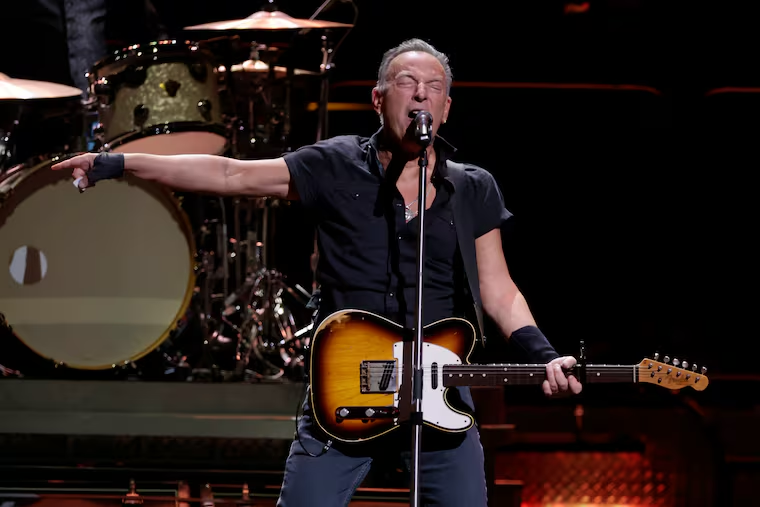Little Steven on Bruce Springsteen: ‘We had no idea how much pain’ the Boss was in this summer
The E Street Band guitarist called his Boss "such a tough guy." Springsteen performed in New York on Monday, and his tour will resume in March, with Philadelphia dates in August.

When Bruce Springsteen abruptly postponed his two Philadelphia concerts at Citizens Bank Park in August ― and then went on to play five shows in New England and New Jersey before calling off the rest of his 2023 dates ― “we were just as surprised as everyone else to learn the extent of his illness,” E Street Band guitarist Steve Van Zandt has said.
Springsteen initially called off his Philly shows, announcing only that he was “taken ill,” but later revealing that he is suffering from peptic ulcer disease and had been advised by doctors to reschedule all of his concerts this year, including the Philadelphia shows now slated for Aug. 21 and 23.
“I got to tell you the truth, we had no idea how much pain he was in,” Van Zandt ― also variously known as Little Steven and Miami Steve ― told USA Today at the Rock and Roll Hall of Fame induction ceremony in Brooklyn on Friday.
““It was remarkable when we found out that he had been in pain for five shows at least; he is just a tough guy,” Van Zandt said.
Since he’s been off the road and recovering from his illness, Springsteen has made few public appearances. Last month, he showed up at a Monmouth College symposium that marked the 50th anniversary of the release of his 1973 album The Wild, The Innocent & the E Street Shuffle. The event featured acts including Adam Weiner of Philadelphia’s Low Cut Connie, who performed “Incident on 57th Street” with original E Street drummer Vini “Mad Dog” Lopez.
And on Monday at David Geffen Hall at Lincoln Center in New York, he surprised the audience at the Stand Up For Heroes fundraiser for veterans’ causes for the Bob Woodruff Foundation. He first joined John Mellencamp for “Wasted Days” and then sang five of his own songs, featuring the live debut of “Addicted to Romance” from Rebecca Miller’s new movie, She Came to Me.
The Springsteen tour is scheduled to resume March 19 in Phoenix. This week, tickets went on sale for the Boss & E Street Band’s 2024 European stadium tour, which kicks off in Wales on May 5 and runs until the end of July.
Peptic ulcer disease involves open sores in the stomach or first part of the small intestine, with abdominal pain and nausea among the common symptoms. At the Rock Hall ceremony, Van Zandt said Springsteen “is all good now” and the band plans to “come back stronger than ever in March.”
Here’s what to know about peptic ulcer disease and how to treat it.
What is peptic ulcer disease, and what are its symptoms?
Peptic ulcers are sores in the stomach lining or the duodenum, the upper part of the small intestine. “Peptic ulcer disease” is the generic term for ulcers in this area and does not denote a more severe form of ulcers.
Besides symptoms like weight loss and appetite changes, the disease can cause vomiting, difficulty breathing, and feeling faint.
The risk of getting an ulcer sometime in your lifetime is about 5% to 10%, but ulcers are more common as people get older, Leo Katz, the associate chief of Jefferson Health’s Division of Gastroenterology and Hepatology, told The Inquirer in September.
What causes peptic ulcer disease?
Peptic ulcers are usually caused by taking too many nonsteroidal anti-inflammatory drugs like naproxen sodium (for example, the brand-name drug Aleve) and ibuprofen (including the brand-name drug Advil). Those medications can decrease the production of lipids in the stomach and small intestine that help prevent ulcers, or heal them when they form.
Ulcers can also form from an infection in the stomach caused by the bacterium Helicobacter pylori.
Springsteen has not said what caused his peptic ulcer disease, but the length of time he has taken to receive treatment might indicate a more complicated case, Katz told The Inquirer in September. (Katz is not treating Springsteen and could not provide more information on his case without specifics on his condition.)
How do you treat peptic ulcer disease?
Medications that suppress acid in the stomach, like the brand-name drugs Prilosec and Nexium, can give ulcers time to heal on their own. Antibiotics can also treat ulcers caused by bacteria. Patients should stop taking Aleve or Advil if their ulcers formed from overusing those medications.